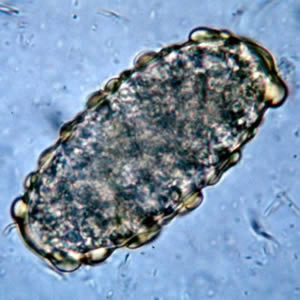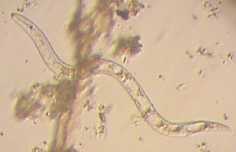Ascariasis
Editor-In-Chief: Prab R Tumpati, MD
Obesity, Sleep & Internal medicine
Founder, WikiMD Wellnesspedia &
W8MD medical weight loss NYC and sleep center NYC
| Ascariasis | |
|---|---|

| |
| Synonyms | N/A |
| Pronounce | N/A |
| Specialty | N/A |
| Symptoms | Abdominal pain, vomiting, intestinal obstruction |
| Complications | Malnutrition, growth retardation |
| Onset | 4–8 weeks after ingestion of eggs |
| Duration | Months to years |
| Types | N/A |
| Causes | Ascaris lumbricoides |
| Risks | Poor sanitation, soil-transmitted helminth infections |
| Diagnosis | Stool test, imaging |
| Differential diagnosis | Other helminth infections, appendicitis, intestinal obstruction |
| Prevention | Improved sanitation, deworming |
| Treatment | Anthelmintic medications such as albendazole, mebendazole |
| Medication | N/A |
| Prognosis | N/A |
| Frequency | 800 million to 1.2 billion people globally |
| Deaths | 2,700 (2010) |
- An infection that is caused by the roundworm Ascaris lumbricoides, many cases of which remain asymptomatic.
- During the transient larval migratory phase, shortness of breath, fever, and eosinophilia can occur.
- Depending on the intestinal worm burden, a spectrum of gastrointestinal tract symptoms can occur
About ascariasis[edit | edit source]
- Ascaris is an intestinal parasite of humans.
- It is the most common human worm infection.
- The larvae and adult worms live in the small intestine and can cause intestinal disease.
Transmission[edit | edit source]
- Ascaris lives in the intestine and Ascaris eggs are passed in the feces of infected persons.
- If the infected person defecates outside (near bushes, in a garden, or field), or if the feces of an infected person are used as fertilizer, then eggs are deposited on the soil.
- They can then mature into a form that is infective.
- Ascariasis is caused by ingesting infective eggs.
- This can happen when hands or fingers that have contaminated dirt on them are put in the mouth or by consuming vegetables or fruits that have not been carefully cooked, washed or peeled.
Risk factors[edit | edit source]
- Infection occurs worldwide in warm and humid climates, where sanitation and hygiene are poor, including in temperate zones during warmer months. Persons in these areas are at risk if soil contaminated with human feces enters their mouths or if they eat vegetables or fruit that have not been carefully washed, peeled or cooked.
- Ascariasis is now uncommon in the United States.
Symptoms of ascariasis[edit | edit source]
- People infected with Ascaris often show no symptoms. If symptoms do occur they can be light and include abdominal discomfort. Heavy infections can cause intestinal blockage and impair growth in children.
- Other symptoms such as cough are due to migration of the worms through the body.
Diagnosis[edit | edit source]
- Health care providers can diagnose ascariasis by taking a stool sample and using a microscope to look for the presence of eggs.
- Some people notice infection when a worm is passed in their stool or is coughed up.
- If this happens, bring in the worm specimen to your health care provider for diagnosis.
Prevention of infections[edit | edit source]
- Avoid contact with soil that may be contaminated with human feces, including with human fecal matter (“night soil”) used to fertilize crops.
- Wash your hands with soap and warm water before handling food.
- Teach children the importance of washing hands to prevent infection.
- Wash, peel, or cook all raw vegetables and fruits before eating, particularly those that have been grown in soil that has been fertilized with manure.
Transmission of infection to others can be prevented by:
- Not defecating outdoors, and by
- Effective sewage disposal systems.
Treatment[edit | edit source]
- Anthelminthic medications (drugs that rid the body of parasitic worms), such as albendazole and mebendazole, are the drugs of choice for treatment. Infections are generally treated for 1-3 days. The recommended medications are effective.
- In developing countries, groups at higher risk for soil-transmitted helminth infections (hookworm, Ascaris, and whipworm) are often treated without a prior stool examination.
- Treating in this way is called preventive treatment (or “preventive chemotherapy”).
- The high-risk groups identified by the World Health Organization are preschool and school-age children, women of childbearing age (including pregnant women in the 2nd and 3rd trimesters and lactating women) and adults in occupations where there is a high risk of heavy infections.
Mass drug administration (MDA)[edit | edit source]
- School-age children are often treated through school-health programs and preschool children and pregnant women at visits to health clinics.
- The soil-transmitted helminths (hookworm, Ascaris, and whipworm) and four other “neglected tropical diseases” (river blindness, lymphatic filariasis, schistosomiasis and trachoma) are sometimes treated through mass drug administrations.
- Since the drugs used are safe and inexpensive or donated, entire risk groups are offered preventive treatment.
- Mass drug administrations are conducted periodically (often annually), commonly with drug distributors who go door-to-door.
- Multiple neglected tropical diseases are often treated simultaneously using MDAs.
| This article is a medical stub. You can help WikiMD by expanding it! | |
|---|---|
| Parasitic disease caused by helminthiases | ||||
|---|---|---|---|---|
|
Transform your life with W8MD's budget GLP1 injections from $125
W8MD offers a medical weight loss program NYC and a clinic to lose weight in Philadelphia. Our W8MD's physician supervised medical weight loss centers in NYC provides expert medical guidance, and offers telemedicine options for convenience.
Why choose W8MD?
- Comprehensive care with FDA-approved weight loss medications including:
- loss injections in NYC both generic and brand names:
- weight loss medications including Phentermine, Qsymia, Diethylpropion etc.
- Accept most insurances for visits or discounted self pay cost.
- Generic weight loss injections starting from just $125.00 for the starting dose
- In person weight loss NYC and telemedicine medical weight loss options in New York city available
- Budget GLP1 weight loss injections in NYC starting from $125.00 biweekly with insurance!
Book Your Appointment
Start your NYC weight loss journey today at our NYC medical weight loss, and Philadelphia medical weight loss Call (718)946-5500 for NY and 215 676 2334 for PA
Search WikiMD
Ad.Tired of being Overweight? Try W8MD's NYC physician weight loss.
Semaglutide (Ozempic / Wegovy and Tirzepatide (Mounjaro / Zepbound) available. Call 718 946 5500.
Advertise on WikiMD
|
WikiMD's Wellness Encyclopedia |
| Let Food Be Thy Medicine Medicine Thy Food - Hippocrates |
Translate this page: - East Asian
中文,
日本,
한국어,
South Asian
हिन्दी,
தமிழ்,
తెలుగు,
Urdu,
ಕನ್ನಡ,
Southeast Asian
Indonesian,
Vietnamese,
Thai,
မြန်မာဘာသာ,
বাংলা
European
español,
Deutsch,
français,
Greek,
português do Brasil,
polski,
română,
русский,
Nederlands,
norsk,
svenska,
suomi,
Italian
Middle Eastern & African
عربى,
Turkish,
Persian,
Hebrew,
Afrikaans,
isiZulu,
Kiswahili,
Other
Bulgarian,
Hungarian,
Czech,
Swedish,
മലയാളം,
मराठी,
ਪੰਜਾਬੀ,
ગુજરાતી,
Portuguese,
Ukrainian
Medical Disclaimer: WikiMD is not a substitute for professional medical advice. The information on WikiMD is provided as an information resource only, may be incorrect, outdated or misleading, and is not to be used or relied on for any diagnostic or treatment purposes. Please consult your health care provider before making any healthcare decisions or for guidance about a specific medical condition. WikiMD expressly disclaims responsibility, and shall have no liability, for any damages, loss, injury, or liability whatsoever suffered as a result of your reliance on the information contained in this site. By visiting this site you agree to the foregoing terms and conditions, which may from time to time be changed or supplemented by WikiMD. If you do not agree to the foregoing terms and conditions, you should not enter or use this site. See full disclaimer.
Credits:Most images are courtesy of Wikimedia commons, and templates, categories Wikipedia, licensed under CC BY SA or similar.
Contributors: Prab R. Tumpati, MD







